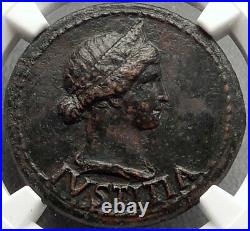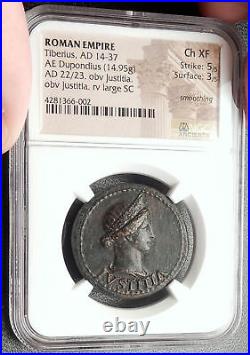LIVIA Augustus Wife 22AD TIBERIUS Rome Ancient Roman Coin NGC Certified i66477






Item: i66477 Authentic Ancient Coin of. Bronze Dupondius 30mm (14.95 grams) Rome mint. Struck under Tiberius, 22-23 A. Reference: RIC I 46 (Tiberius); Sear 1739 Pedigree / Provenance: From the Archer M. Huntington Collection, ANS 1001.1.12257.
Ch XF Strike: 5/5 Surface: 3/5 4281366-002 IVSTITIA below, diademed and draped bust of Livia as Justitia right. TI CAESAR DIVI AVG F AVG TR POT XXIIII around large S.
Wife of Augustus, Mother of Tiberius, & Grandmother of Claudius. Archer Milton Huntington (March 10, 1870 - December 11, 1955) was the son of Arabella (née Duval) Huntington and the stepson of railroad magnate and industrialist Collis P.A lifelong friend of the arts, he is known for his scholarly works in the field of Hispanic Studies and for founding The Hispanic Society of America in New York City. He was also a major benefactor of the American Academy of Arts and Letters and the American Numismatic Society which he convinced to relocate next to the Hispanic Society at the Beaux Arts Audubon Terrace complex in New York's Washington Heights. In 1932, he founded the Brookgreen Gardens sculpture center in South Carolina; and the Mariners' Museum which is one of the largest maritime museums in the world, in Newport News, Virginia, a new independent city that was established in the late 19th century largely though the efforts of his stepfather Collis P. Livia Drusilla, (Classical Latin: LIVIA.
AVGVSTA) (58 BC-AD 29), after her formal adoption into the Julian family in AD 14 also known as Julia Augusta, was a Roman empress as the third wife of the. Emperor Augustus and his advisor. She was the mother of the Emperor Tiberius, paternal grandmother of the Emperor Claudius, paternal great-grandmother of the Emperor Caligula, and maternal great-great grandmother of the Emperor Nero. She was deified by Claudius who acknowledged her title of Augusta.
Birth and first marriage to Tiberius Claudius Nero. She was born on 30 January 59 or 58 BC as the daughter of Marcus Livius Drusus Claudianus by his wife Aufidia, a daughter of the magistrate Marcus Aufidius Lurco. The diminutive Drusilla often found in her name suggests that she was a second daughter. Marcus Livius Drusus was her brother.
She was probably married in 43 BC. Her first child, the future Emperor Tiberius, was born in 42 BC.
Her father married her to Tiberius Claudius Nero, her cousin of patrician status who was fighting with him on the side of Julius Caesar's assassins against Octavian. Her father committed suicide in the Battle of Philippi, along with Gaius Cassius Longinus and Marcus Junius Brutus, but her husband continued fighting against Octavian, now on behalf of Mark Antony and his brother. In 40 BC, the family was forced to flee Italy in order to avoid Octavian's proscriptions and joined with Sextus Pompeius in Sicily, later moving on to Greece. At this time, Livia already had a son, the future emperor Tiberius, and was pregnant with the second, Nero Claudius Drusus (also known as Drusus the Elder). Legend said that Octavian fell immediately in love with her, despite the fact that he was still married to Scribonia.
Octavian divorced Scribonia in 39 BC, on the very day that she gave birth to his daughter Julia the Elder (Cassius Dio). Seemingly around that time, when Livia was six months pregnant, Tiberius Claudius Nero was persuaded or forced by Octavian to divorce Livia.
On 14 January, the child was born. Octavian and Livia married on January 17, waiving the traditional waiting period. Tiberius Claudius Nero was present at the wedding, giving her in marriage just as a father would. The importance of the patrician Claudii to Octavian's cause, and the political survival of the Claudii Nerones are probably more rational explanations for the tempestuous union.
Nevertheless, Livia and Octavian remained married for the next 51 years, despite the fact that they had no children apart from a single miscarriage. She always enjoyed the status of privileged counselor to her husband, petitioning him on the behalf of others and influencing his policies, an unusual role for a Roman wife in a culture dominated by the paterfamilias. After Mark Antony's suicide following the Battle of Actium in 31 BC, Octavian had removed all obstacles to his power and henceforth ruled as Emperor, from 27 BC on, under the honorary title Augustus. He and Livia formed the role model for Roman households. Despite their wealth and power, Augustus's family continued to live modestly in their house on the Palatine Hill. Livia would set the pattern for the noble Roman matrona. She wore neither excessive jewelry nor pretentious costumes, she took care of the household and her husband (often making his clothes herself), always faithful and dedicated. In 35 BC Octavian gave Livia the unprecedented honour of ruling her own finances and dedicated a public statue to her. She had her own circle of clients and pushed many protégés into political offices, including the grandfathers of the later emperors Galba and Otho. With Augustus being the father of only one daughter (Julia the Elder by Scribonia), Livia revealed herself to be an ambitious mother and soon started to push her own sons Tiberius and Nero Claudius Drusus into power. Drusus was a trusted general and married Augustus's favourite niece, Antonia Minor, and had three children: the popular general Germanicus, Livilla, and the Emperor Claudius. Tiberius married Augustus' daughter Julia the Elder in 11 BC and was ultimately adopted by his stepfather in 4 BC and named as Augustus' heir. Rumor had it that when Marcellus, nephew of Augustus, died in 23 BC, it was no natural death, and that Livia was behind it. After the two elder sons of Julia by Marcus Vipsanius Agrippa, whom Augustus had adopted as sons and successors, had died, the one remaining son Agrippa Postumus was incarcerated and finally killed. Tacitus charges that Livia was not altogether innocent of these deaths and Cassius Dio also mentions such rumours, but not even the gossipmonger Suetonius, who had access to official documents, repeats them. Most modern historical accounts of Livia's life discount the idea. There are also rumors mentioned by Tacitus and Cassius Dio that Livia brought about Augustus' death by poisoning fresh figs. Augustus' granddaughter was Julia the Younger. Sometime between 1 and 14, her husband Paullus was executed as a conspirator in a revolt.Modern historians theorize that Julia's exile was not actually for adultery but for involvement in Paulus' revolt. Livia Drusilla plotted against her stepdaughter's family and ruined them. This led to open compassion for the fallen family. Julia died in 29 AD on the same island where she had been sent in exile twenty years earlier.
Life after Augustus, Death, and Aftermath. Augustus died in AD 14, being deified by the senate shortly afterwards. In his will, he left one third of his property to Livia, and the other two thirds to Tiberius. In the will, he also adopted her into the Julian family and granted her the honorific title of Augusta.
These dispositions permitted Livia to maintain her status and power after his death, under the new name of Julia Augusta. For some time, Livia and her son Tiberius, the new Emperor, appeared to get along with each other. Speaking against her became treason in AD 20, and in AD 24 he granted his mother a theatre seat among the Vestal Virgins.
Livia exercised unofficial but very real power in Rome. Eventually, Tiberius became resentful of his mother's political status, particularly against the idea that it was she who had given him the throne. At the beginning of the reign he vetoed the unprecedented title Mater Patriae ("Mother of the Fatherland") that the Senate wanted to bestow upon her, in the same manner in which Augustus had been named Pater Patriae ("Father of the Fatherland"). Tiberius also consistently refused the title of Pater Patriae for himself.
The historians Tacitus and Cassius Dio depict an overweening, even domineering dowager, ready to interfere in Tiberius' decisions, the most notable instances being the case of Urgulania (grandmother of Claudius's first wife Plautia Urgulanilla), a woman who correctly assumed that her friendship with the empress placed her above the law, and Munatia Plancina, suspected of murdering Germanicus and saved at Livia's entreaty. (Plancina committed suicide in 33 AD after being accused again of murder after Livia's death). A notice from AD 22 records that Julia Augusta (Livia) dedicated a statue to Augustus in the centre of Rome, placing her own name even before that of Tiberius.Ancient historians give as a reason for Tiberius' retirement to Capri his inability to endure her any longer. Until AD 22 there had, according to Tacitus, been "a genuine harmony between mother and son, or a hatred well concealed;" Dio tells us that at the time of his accession already Tiberius heartily loathed her. In AD 22 she had fallen ill, and Tiberius had hastened back to Rome in order to be with her. But in AD 29 when she finally fell ill and died, he remained on Capri, pleading pressure of work and sending Caligula to deliver the funeral oration.
Suetonius adds the macabre detail that when she died... After a delay of several days, during which he held out hope of his coming, [she was at last] buried because the condition of the corpse made it necessary... Divine honours he also vetoed, stating that this was in accord with her own instructions.Later he vetoed all the honours the Senate had granted her after her death and canceled the fulfillment of her will. It was not until 13 years later, in AD 42 during the reign of her grandson Claudius, that all her honours were restored and her deification finally completed. She was named Diva Augusta (The Divine Augusta), and an elephant-drawn chariot conveyed her image to all public games. A statue of her was set up in the temple of Augustus along with her husband's, races were held in her honour, and women were to invoke her name in their sacred oaths.
In 410 AD during the Sack of Rome (410) her ashes were scattered when Augustus' tomb was sacked. Her Villa ad Gallinas Albas north of Rome is currently being excavated; its famous frescoes of imaginary garden views may be seen at National Museum of Rome. One of the most famous statues of Augustus (the Augustus of Prima Porta) came from the grounds of the villa. While reporting various unsavoury hearsay, the ancient sources generally portray Livia (Julia Augusta) as a woman of proud and queenly attributes, faithful to her imperial husband, for whom she was a worthy consort, forever poised and dignified. With consummate skill she acted out the roles of consort, mother, widow and dowager. Dio records two of her utterances: Once, when some naked men met her and were to be put to death in consequence, she saved their lives by saying that to a chaste woman such men are in no way different from statues. When someone asked her how she had obtained such a commanding influence over Augustus, she answered that it was by being scrupulously chaste herself, doing gladly whatever pleased him, not meddling with any of his affairs, and, in particular, by pretending neither to hear nor to notice the favourites of his passion. With time, however, and widowhood, a haughtiness and an overt craving for power and the outward trappings of status came increasingly to the fore. Livia had always been a principal beneficiary of the climate of adulation that Augustus had done so much to create, and which Tiberius despised ("a strong contempt for honours", Tacitus, Annals 4.37). In AD 24, typically, whenever she attended the theatre, a seat among the Vestals was reserved for her (Annals 4.16), and this may have been intended more as an honour for the Vestals than for her cf.Ovid, Tristia, 4.2.13f, Epist. Ex Ponto 4.13.29f. Livia played a vital role in the formation of her children Tiberius and Drusus.
Attention focuses on her part in the divorce of her first husband, father of Tiberius, in 39/38 BC. It would be interesting to know her role in this, as well as in Tiberius' divorce of Vipsania Agrippina in 12 BC at Augustus' insistence: whether it was merely neutral or passive, or whether she actively colluded in Caesar's wishes. The first divorce left Tiberius a fosterchild at the house of Octavian; the second left Tiberius with a lasting emotional scar, since he had been forced to abandon the woman he loved for dynastic considerations. Livia in literature and popular culture. In Tacitus' Annals, Livia is depicted as having great influence, to the extent where she "had the aged Augustus firmly under control - so much so that he exiled his only surviving grandson to the island of Planasia".Livia's image appears in ancient visual media such as coins and portraits. She was the first woman to appear on provincial coins in 16 BC and her portrait images can be chronologically identified partially from the progression of her hair designs, which represented more than keeping up with the fashions of the time as her depiction with such contemporary details translated into a political statement of representing the ideal Roman woman. Livia's image evolves with different styles of portraiture that trace her effect on imperial propaganda that helped bridge the gap between her role as wife to the emperor Augustus, to mother of the emperor Tiberius. Becoming more than the "beautiful woman" she is described as in ancient texts, Livia serves as a public image for the idealization of Roman feminine qualities, a motherly figure, and eventually a goddesslike representation that alludes to her virtue.
Livia's power in symbolizing the renewal of the Republic with the female virtues Pietas and Concordia in public displays had a dramatic effect on the visual representation of future imperial women as ideal, honorable mothers and wives of Rome. In the popular fictional work I, Claudius by Robert Graves-based on Tacitus' innuendo-Livia is portrayed as a thoroughly Machiavellian, scheming political mastermind. Determined never to allow republican governance to flower again, as she felt they led to corruption and civil war, and devoted to bringing Tiberius to power and then maintaining him there, she is involved in nearly every death or disgrace in the Julio-Claudian family up to the time of her death. In her deathbed she only fears divine punishment for all she had done, and secures the promise of future deification by her grandson Claudius, an act which, she believes, will guarantee her a blissful afterlife. However, this portrait of her is balanced by her intense devotion to the well-being of the Empire as a whole, and her machinations are justified as a necessarily cruel means to what she firmly considers a noble aspiration: the common good of the Romans, achievable only under strict imperial rule.
In the 1976 BBC television series based on the book, Livia was played by Siân Phillips. Phillips won a BAFTA for her portrayal of the role. In the ITV television series The Caesars, Livia was played by Sonia Dresdel.
A heavily fictionalized version of Livia appears as Xena's daughter in season 5 (1999/2000) of the television series Xena: Warrior Princess where she was adopted and raised by Octavius into an skillfull Roman commander with a lust for blood. After she learn her real identity she starts a path of destruction which puts Xena and her allies at odds. While in a battle it wasn't until getting close to kill her own mother (Xena) she finally comes to terms with the fact and relinquish her violent past and embrace a peacuful way of living. Livia was portrayed by Adrienne Wilkinson. Livia was dramatized in the HBO/BBC series Rome. Introduced in the 2007 episode "A Necessary Fiction", Livia (Alice Henley) soon catches the eye of young Octavian. Rome does acknowledge the existence of Livia's child, Tiberius, by her first husband, but not that she was pregnant with Nero Claudius Drusus when she met Octavian. Livia is portrayed as deceptively submissive in public, while in private she possesses an iron will, and a gift for political scheming that matches Atia's. Livia appears in Neil Gaiman's comic "Distant Mirrors - August" collected in The Sandman: Fables and Reflections.In John Maddox Roberts's short story "The King of Sacrifices, " set in his SPQR series, Livia hires Decius Metellus to investigate the murder of one of Julia the Elder's lovers. In Antony and Cleopatra by Colleen McCullough, Livia is portrayed as a cunning and effective advisor to her husband, whom she loves passionately. Livia plays an important role in two Marcus Corvinus mysteries by David Wishart, Ovid (1995) and Germanicus (1997). She is mentioned posthumously in Sejanus (1998). Luke Devenish's "Empress of Rome" novels, "Den of Wolves" (2008) and "Nest of Vipers" (2010), have Livia as central character in a fictionalized account of her life and times.
The television series, The Sopranos, originally dealt with the relationship between the scheming mother, named Livia, and her crime boss son, Tony Soprano. David Chase, the creator of the show, has said that he could not produce the series while his own mother was alive. World-renowned expert numismatist, enthusiast, author and dealer in authentic ancient Greek, ancient Roman, ancient Byzantine, world coins & more.Ilya Zlobin is an independent individual who has a passion for coin collecting, research and understanding the importance of the historical context and significance all coins and objects represent. Send me a message about this and I can update your invoice should you want this method. Getting your order to you, quickly and securely is a top priority and is taken seriously here.
Great care is taken in packaging and mailing every item securely and quickly. What is a certificate of authenticity and what guarantees do you give that the item is authentic? You will be very happy with what you get with the COA; a professional presentation of the coin, with all of the relevant information and a picture of the coin you saw in the listing.
Additionally, the coin is inside it's own protective coin flip (holder), with a 2x2 inch description of the coin matching the individual number on the COA. Whether your goal is to collect or give the item as a gift, coins presented like this could be more prized and valued higher than items that were not given such care and attention to. When should I leave feedback? Please don't leave any negative feedbacks, as it happens sometimes that people rush to leave feedback before letting sufficient time for their order to arrive. The matter of fact is that any issues can be resolved, as reputation is most important to me.My goal is to provide superior products and quality of service. How and where do I learn more about collecting ancient coins? Visit the Guide on How to Use My Store. For on an overview about using my store, with additional information and links to all other parts of my store which may include educational information on topics you are looking for.
This item is in the category "Coins & Paper Money\Coins: Ancient\Roman: Imperial (27 BC-476 AD)". The seller is "highrating_lowprice" and is located in this country: US. This item can be shipped worldwide.
- Ruler: Livia
- Coin Type: Ancient Roman
- Ancient Coins: Roman Coins
- Provenance: Archer M. Huntington Collection
- Certification: NGC
- Certification Number: 4281366-002
- Denomination: Dupondius
- Grade: Ch XF
- Year: Year_in_description
